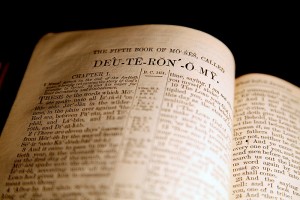How can a man have his past sins absovled, atoned for or washed away? There is only one way. The Bible reveals what that way is. Watch this video to find the answer.
Tag Archives: Torah
Is obedience to Torah legalism and a system to earn YHVH’s favor?
What is the Book of Deuteronomy all about?
More Insights About the Book of Deuteronomy
In stark terms, YHVH warns the Isaelites in Deuteronomy of the struggles Israel will have as it walks between two world: the lower world that attaches itself to man’s soul and attempts to pull him downward, and the upper world that pulls the spirit in man heavenward.
Deuteronomy presents Torah (as does Ps 119) as the way to be spiritually, physically, mentally, emotionally, materially elevated before Elohim and in the eyes of the surrounding nations (Deut 4:6).
In Deuteronomy, YHVH lays out two extremes: blessings for obedience and curses for disobedience; curse for following the ways of this world, and blessings for following the Word of YHVH. But seldom do individuals find themselves in one extreme or the other, for few are either totally worldly or totally heavenly in the orientation of their lives. They are usually caught up somewhere in the middle ground between the two: not totally evil and not totally good. Their lives are a mixed bag of good and evil, blessings and curses, and a double-orientation toward the heaven and the world. The Bible calls this double-mindedness (Jas 1:8; 4:8), and Yeshua decries such an individual (Matt 6:24, “one can’t serve both God and mammon”). The Bible also calls this being lukewarm—being neither hot nor cold, and YHVH hates this as well (Rev 3:15–16). Such an individual, if he isn’t careful, can find himself feeding spiritually more from the tree of the knowledge of good and evil rather than the tree of life.
YHVH lays out the highest spiritual ideal for Israel: to be wisdom in the sight of the nations (Duet 4:6), to be the head and not the tail, to be the greatest and not the least, and to be the lender and not the borrower. Such a position of status is possible thanks to following the Torah. He wants the best for his people, but achieving such is conditional on their obeying him. Many people make claim to believe in the God of the Bible, to love him and many even claim to follow and to obey him—just ask them! But in reality, do they? What are the fruits of their lives? Their true spiritual status is based on what they do, not what they profess with their mouths!
Deuteronomy affirms the sufficiency of Torah. The Torah is the Word of Elohim and nothing more needs to be added to it. It is the full revelation of YHVH when it says not to add to the Word of Elohim (Deut 4:2; 12:32). It is the bedrock of the Scriptures and the bedrock of truth. If Torah is the bedrock of YHVH’s word, then the Ten Commandments are the cornerstone in that foundation of truth, which Moses reiterates in Deuteronomy five. The rest of the Scriptures are just commentary or elucidations on Torah, or Continue reading
Trying to Catch Flies With Vinegar — Let’s Stop Bashing Christians!
I’d like to take this opportunity to make my dear readers aware of some important facts about our Christian brothers and sister.
First, let me say that I’m not angry at Christians, I don’t hate them, and I try not to speak disparagingly of them. There for the grace of YHVH go I. Until YHVH opens their eyes to the truth of the rest of Torah, they will remain where they are, even as most people reading this blog post once were smugly blind in the Christian church to the deeper truths of the Torah until YHVH opened their eyes. So let’s have mercy on them! Please!!!
Next, the ones I have a real problem with in the Christian church are the hireling leaders. They should know better, since they purport to be Bible experts. However, many of them are trapped in a harlot, secular humanistic religious system that has elevated the mind of man over that of the Creator. This is a classical definition of secular humanism. Go read Continue reading
Who is the liar? Elohim or the mainstream church?
Numbers 23:19, El is not a man that he should lie. Read the rest of this verse, which speaks about the immutable character of Elohim. (Also see Mal 3:6; Heb 13:8.) From the beginning in the Garden of Eden (thanks to the lies of Satan the serpent, see Gen 3:1–4), man has been under the spiritual delusion that Elohim changes his word, laws or commandments and that he doesn’t really mean what he says. That is to say, when YHVH gives a command, later on he may change his mind and his commands are no longer applicable to subsequent generations or people-groups.
Down through the ages, church leaders have bought in to this lie of the enemy with regard to validity of the Torah as pertaining to the life of the redeemed believer. But by saying that the Torah is “done away with,” “has been nailed to the cross” “has been fulfilled in Jesus” meaning “he did it for us so that we don’t have to do it,” isn’t this really calling Elohim a liar?
Consider the numerous places throughout the Bible, the Word of Elohim, where the Torah is revealed as YHVH’s unalterable standard of righteousness for all time and for all people everywhere. (In this regard, read the following scriptures: Ps 119:44, 142, 144, 160, 172; Matt 4:4; 5:18–19; Rom 3:31; 7:12.)
Communion and the Power to Live a Torah-Obedient Life
1 Corinthians 11:23, This is my body. We are sanctified through the offering of the body of Yeshua (Heb 10:10).When we eat the bread of communion, we are “eating” Yeshua who is the incarnate and Living Torah Word of Elohim (John 1:14). We are announcing that Yeshua is the spiritual bread of life from heaven that leads to eternal life (John 6:48–51), and we are announcing our desire to live by the totality of his Word (Matt 4:4).
The bread symbolizing the body of Yeshua was unleavened, which is a picture of Yeshua’s sinless life. By eating this bread, we declare our faith in his sinless life by which he was able to pay for our sins. We also declare our identification with his sinlessness as an example for us to follow.
Yeshua took the unleavened bread and broke it signifying our deliverance from our sin nature by the breaking or death of his sinless body. The unleavened bread broken during the Passover meal speaks of our deliverance from the power of sin by the death of our old man. The rite of baptism is a picture of this (Rom 6:4–13). This paves the way for us to live a sanctified (sin-free) life.
We become unleavened or sinless (known as sanctification) because Yeshua our Passover Lamb was sacrificed for us (1 Cor 5:7). Our body of sin died with Yeshua when we were baptized making us unleavened (or sanctified, Rom 6:6). Let us therefore live in accordance with the new man, or new spiritual creation we have become through Yeshua (1 Cor 5:8; 2 Cor 5:17; Gal 2:20). When we eat the unleavened bread at the communion part of the Passover service, we remember that we are sanctified by grace and that the power of sin(or Torahlessness, see 1 John 3:4 cp. John 14:15) has been broken in our lives.
In the first Passover, the children of Israel were delivered from the penalty of their sins by the blood of the lamb on the door. But when they ate the unleavened bread, this speaks of their being delivered from their slavery to sin and oppression in Egypt. They were now to leave Egypt (a spiritual picture of the old man and life) and go toward the Promised Land (a spiritual picture of the new man) taking with them, on their knees, the dough of the unleavened bread. This illustrates the fact that they were to walk in the newness of a spiritually unleavened or sanctified life. When we eat the bread of communion, we memorialize the events surrounding the Exodus, and recognize the present reality of freedom from sin in our own lives.
1 Corinthians 11:25, My blood. By the blood of Yeshua we are redeemed, liberated or released from the bondage of sin (Matt 26:28; Rom 3:25; Eph 1:17; Col 1:14; Heb 9:22; 1 Pet 1:18; Rev 5:9) and from sin’s death penalty claim on us (Rom 6:23; Ezek 18:4) brought on by our disobedience to YHVH’s instructions in righteousness, the Torah (which defines sin, 1 John 3:4). His blood also sanctifies (or separates, Heb 9:13–14; 13:12) us from past sin (Rom 3:25) or Torahlessness allowing us to become a new spiritual creation before YHVH (2 Cor 5:17; Gal 2:20) in order to become a pure and special people who are zealous for good works (Tit 23:14), who will serve YHVH in righteousness, which is the good works of the Torah (Ps 119:172).
Video: “Under the Law” Meaning Explained
In 1 Cor 9:19–21 Paul writes,
For though I am free from all men, I have made myself a servant to all, that I might win the more; and to the Jews I became as a Jew, that I might win Jews; to those who are under the law, as under the law, that I might win those who are under the law; to those who are without law, as without law (not being without law toward God, but under law toward Messiah), that I might win those who are without law…
What on earth does Paul mean when he uses the phrase “under the law” in this passage and elsewhere in his writings? Does it mean, as the mainstream church teaches, that the Torah has been done away with and is no longer necessary for believers today? If so, then what does Paul mean when he says “under the law toward Messiah”? Is it possible that he’s talking about being Torah-obedient in relationship with and through the Messiah? If so, perhaps this what John is referring to when he mentions the end time saints who keep the Torah-commandments of Elohim and who also have the testimony, faith or gospel of Yeshua (Rev 12:17 and 14:12).
To answer these questions and much more, I invite you to watch my video on “Under the Law” Meaning Explained at





